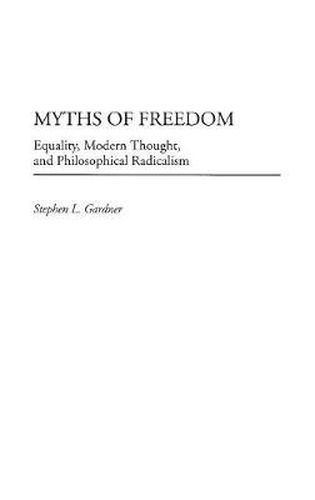Readings Newsletter
Become a Readings Member to make your shopping experience even easier.
Sign in or sign up for free!
You’re not far away from qualifying for FREE standard shipping within Australia
You’ve qualified for FREE standard shipping within Australia
The cart is loading…






The status of the modern age has long been debated, but since post-modernism, it has assumed centrality as if it were the issue of philosophy. Gardner brings a new approach to the problem of modernity, based on theories of Rene Girard and others. While modernity is commonly seen as an ideological project or interpretation of Being, Gardner sees it in terms of the structure of human relations and their impact on philosophy. The decisive feature of the modern world is what Tocqueville called equality of conditions, which has wrought a revolution in the self-image of the individual and in one’s dealings with others. But, in the process, it has replaced old myths-debunked by the Enlightenment-with new ones of its own invention. Hence emerged the myths of freedom-of the autonomy of the self or the spontaneity of passion, or later, of emancipation or authenticity-from Descartes to Heidegger.
Gardner probes the central issue: To what extent have philosophers clarified these myths, or, perhaps, succumbed to their illusions. This inquiry attacks the major dogmas of contemporary criticism-such as the primacy of the question of technology, or of the quarrel of ancients and moderns. It restores the philosophical legitimacy of anthropology, both in opposition to Heidegger’s ontology and to the deconstructive retreat into an idealism, and in contrast to classical political philosophy. This provocative analysis will be of interest to philosophers, political theorists, and others dealing with the problem of modernity.
$9.00 standard shipping within Australia
FREE standard shipping within Australia for orders over $100.00
Express & International shipping calculated at checkout
The status of the modern age has long been debated, but since post-modernism, it has assumed centrality as if it were the issue of philosophy. Gardner brings a new approach to the problem of modernity, based on theories of Rene Girard and others. While modernity is commonly seen as an ideological project or interpretation of Being, Gardner sees it in terms of the structure of human relations and their impact on philosophy. The decisive feature of the modern world is what Tocqueville called equality of conditions, which has wrought a revolution in the self-image of the individual and in one’s dealings with others. But, in the process, it has replaced old myths-debunked by the Enlightenment-with new ones of its own invention. Hence emerged the myths of freedom-of the autonomy of the self or the spontaneity of passion, or later, of emancipation or authenticity-from Descartes to Heidegger.
Gardner probes the central issue: To what extent have philosophers clarified these myths, or, perhaps, succumbed to their illusions. This inquiry attacks the major dogmas of contemporary criticism-such as the primacy of the question of technology, or of the quarrel of ancients and moderns. It restores the philosophical legitimacy of anthropology, both in opposition to Heidegger’s ontology and to the deconstructive retreat into an idealism, and in contrast to classical political philosophy. This provocative analysis will be of interest to philosophers, political theorists, and others dealing with the problem of modernity.